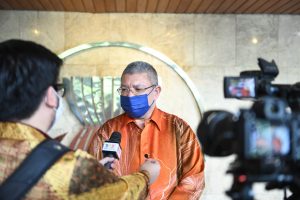Yesterday, as many observers of Malaysian politics anticipated, Prime Minister Ismail Sabri Yaakob announced the dissolution of Parliament, paving the way for general elections that are expected to be held in early November.
In the best-case scenario, the general election could bring some stability to Malaysian politics after an unsettled period that has seen two coalitions collapse and three prime ministers serve since early 2020. But the coming general election could also have regional flow-on effects, particularly with regard to Malaysia’s policy toward Myanmar.
Malaysia’s current foreign minister, Saifuddin Abdullah, is currently spearheading Malaysia’s approach to the crisis that has engulfed Myanmar since the military seized power in February 2021, overthrowing the country’s elected civilian government. Since taking up his post in August of last year, Saifuddin has emerged as perhaps the most energetic Southeast Asian envoy on the crisis in Myanmar and has repeatedly urged the Association of Southeast Asian Nations (ASEAN) to craft a more realistic approach to the crisis.
He has also called into question whether ASEAN’s Five-Point Consensus peace plan is viable, arguing that the junta has largely ignored its main demands for a cessation of violence and political dialogue involving “all parties” to the conflict. On the contrary, the military administration has intensified its attempts to eradicate the opposition to its rule, while refusing to deal with the National Unity Government (NUG), which is coordinating the armed and political opposition to military rule.
Saifuddin is the only ASEAN foreign minister who has publicly met with members of the NUG, and he has issued several calls for his Southeast Asian colleagues to follow suit.
After meeting with NUG ministers on the sidelines of the United Nations General Assembly in New York last month, Saifuddin said that the upcoming ASEAN Summit in Phnom Penh, which could well fall very close to the Malaysian election, would be an important test for the Southeast Asian bloc.
“Between now and the ASEAN summit in November ASEAN must seriously review if the Five-Point Consensus is still relevant, and if it should be replaced with something better,” Saifuddin said, according to a report by Reuters. “By the time we meet in November, we must ask that hard question and we must have the answer during that time.”
How much longer Saifuddin will be able to coordinate Malaysia’s position remains to be seen, however. His party Parti Pribumi Bersatu Malaysia – or BERSATU for short – holds just 28 seats in the 222-seat lower house of parliament. Few observers of Malaysian politics expect BERSATU, an ethnic Malay party that was formed in 2017 as a haven for defectors from the ruling United Malays National Organisation (UMNO) amid the 1MDB corruption scandal, to perform well at the election, given its recent loss of support within the coalition since its president, Muhyiddin Yassin, stepped down as prime minister in August 2021.
Coming off the back of a string of decisive state-level election victories, UMNO’s top brass are hoping that an election will return them to power, with a reduced reliance on the support of small parties. Even if BERSATU performs credibly, it will remain at best a minority component of the eventual governing coalition. There is therefore no guarantee that Saifuddin will remain in his position beyond the next general election.
While Malaysia’s Foreign Ministry can be expected to guarantee a certain amount of continuity in the country’s policy toward Myanmar, it is unclear whether the next foreign minister would similarly prioritize the issue, or be as willing as Saifuddin to break the ASEAN taboo against bald criticisms of member states. This is just one way in which Malaysia’s domestic political instability of Malaysian politics could have impacts beyond the country’s own borders.

































